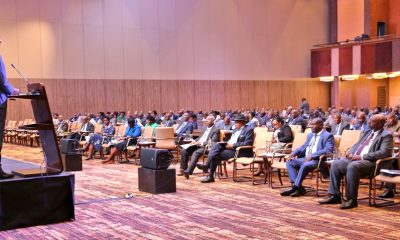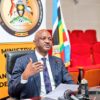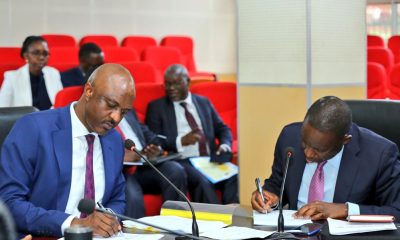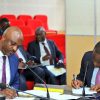Ramathan Ggoobi
Mbabazi hysteria and Gov’t performance
Has the Museveni-Mbabazi ‘rivalry’ created McCarthyism in Government?
Mr. President, it’s now an open secret that your relationship with longtime political ally and friend, Prime Minister Amama Mbabazi, is at its lowest. It’s a power struggle that began when the latter started to strategically position himself in preparation to take over from you as President of our Republic.
Although there is a lot of doublespeak as to whether Mbabazi will stand against you when the National Resistance Movement (NRM) delegates’ conference convenes, the realities on the ground suggest it is no longer a matter of ‘if’ but ‘when’.
Consequently, the entire nation is engulfed in political uncertainty. Your actions have not helped but worsened the suffocation. You have deployed Members of Parliament (MPs) belonging to the NRM Party to go around the country buying support of their electorates to ring-fence your sole candidacy come 2016. MPs have been caught on media cameras giving money to people so that they pass resolutions in support of the infamous “Kyankwanzi Resolution”!
On his part, Mbabazi, although has tried to play his cards near the chest, often sounding more calculative while commenting on these issues, his doublespeak has worked only to confirm what doomsayers have been telling us — “things might never be the same again.”
Economy is bleeding
Subsequently, this political rivalry between you, Mr. President and your Secretary General, Prime Minister, and formerly your No. 1 blue-eyed boy, the man whom not long ago you told us was the only person you trusted, has left government, the economy, and the entire nation bleeding.
Leaders in government, right from cabinet all the way to LC 1, have been divided into camps; some belonging to the Museveni camp, while others to the Mbabazi camp. Those that belong to or are simply suspected to belong to either camp, have been subjected to unfair accusations and as a result have been coldshouldered. This is what the Americans refer to as McCarthyism.
McCarthyism is the practice of making accusations of disloyalty, subversion, or even treason without proper regard for evidence. It also means the practice of making unfair allegations or using unfair investigative techniques, especially in order to restrict dissent or political criticism.
The term has its origins in the period in the United States known as the Second Red Scare, lasting roughly from 1950 to 1956 and characterized by heightened political repression against communists, as well as a fear campaign spreading paranoia of their influence on American institutions and espionage by Soviet agents.
Unsubstantiated accusations
Originally coined to criticize the anti-communist pursuits of U.S. Senator Joseph McCarthy of Wisconsin, “McCarthyism” soon took on a broader meaning, and it’s now used more generally to describe reckless, unsubstantiated accusations, as well as demagogic attacks on the character or patriotism of political adversaries.
During the McCarthy era, thousands of Americans were accused of being communists or communist sympathizers and became the subject of aggressive investigations and questioning before government or private-industry panels, committees and agencies. The primary targets of such suspicions were government employees, those in the entertainment industry, educators and union activists.
Suspicions were often given credence despite inconclusive or questionable evidence, and the level of threat posed by a person’s real or supposed leftist associations or beliefs was often greatly exaggerated. Many people, especially the youth and Hollywood stars suffered imprisonment, often coming about through trial verdicts that were later overturned.
The cold war might long have ended but the political divisions McCarthyism created in the United States continue to make themselves manifest, and the politics and history of anti-Communism in the United States are still contentious. Loyalty oaths for officials and employees of government, that we all embraced, started as a result of McCarthyism.
From Besigye to “Mbabazi supporter”
Mr. President, it is McCarthyism to aggressively question a person’s patriotism, using accusations of disloyalty to pressure a person to adhere to conformist politics or to discredit an opponent, and to subvert civil rights in the name of national security.
McCarthyism is synonymous with witch-hunt, mass hysteria and moral panic. I can see all ills these have started to manifest themselves in our country.
A few years ago it was Kizza Besigye that was being used by those who wanted to witch-hunt others. Whoever wanted a plausible justification to harass their rivals in government, they baptized them “Besigye supporter”. Many lost jobs; other got demoted while even a few might have lost their lives as a result of these cooked-up accusations.
But because Besigye was an ‘outsider’, having opted out of the system at the end of the 1990s, his own McCarthyism effect quickly became endurable.
With Amama Mbabazi, however, a man who is so deeply rooted in the State apparatus, the impact is far reaching. There is now a lot of mistrust in government. Leaders can no longer interact freely for fear that those they talk to might be belonging to a ‘wrong’ camp.
Political uncertainty
This McCarthyism is not confined in government alone. No! Even businessmen are not sure! It should be noted that although our economy is private sector based, reality is that the public sector still plays a big-brother role in its actual functioning. Many businessmen rely on the State to make money, either by getting contracts to supply the State or by reducing their tax reliabilities through their political godfathers.
Mr. President, the Mbabazi hysteria has also affected the economic performance. Although has been slowly recovering from the slump it experienced in 2011/12, this recovery is now at risk. The political uncertainty is causing anxiety among investors. People cannot be sure to make investments sin a country where the President and his Prime Minister cannot sit in the same meeting.
Investors can tolerate any risk but not political uncertainty. This is mainly because unlike other risks, political uncertainty is not insurable. No insurance company sells a policy against political uncertainty. I am yet to check with the actual statistics but I do not have to be a genius to predict that either there has already been a slowdown in capital inflow in the form of FDIs or increased capital flight on the account of political uncertainty.
Mr. President, the ball is in your hands; you must sort out this Mbabazi question quickly. Either make a reshuffle and sack him as Prime Minister so that you relieve your colleagues in government of the anguish of having to always make calculative moves, statements and gestures while dealing with two warring bosses, or retire and give others a chance to govern.
“Darkness in the evening”
I can see the way you are behaving you could be guilty of something as far as your strained relationship with Mbabazi is concerned. Otherwise, why do you behave the way you are doing? You’ve literally surrendered the country to political confusion — resorting to buying support, ring-fencing all the money for that purpose. The economy is bleeding.
In all economies, when public expenditure is condensed, not for economic/fiscal reasons but for political reasons, the private sector suffers. And when private sector shrinks, government revenue is affected. The cycle continues until a recession is created. This is what exactly is happening in our country.
Since July 2013, government has defaulted on its obligations including paying public servants their emoluments, paying its contractors, paying its suppliers and all other creditors. As a result aggregate demand has reduced all over the country. This has affected businesses, farmers, and other producers.
The Mbabazi hysteria created McCarthyism in Government — permeating through the State right from cabinet down to local governments, government agencies, institutions and parastatals — it has also affected the economy. These are worrying times for Uganda.
We thought NRM had sorted out these fears that had engulfed our country throughout the 1970s and the ‘80s. Back in the days, it was “darkness at noon”. Now it is “darkness in the evening”.
Mr. President, I have always written in these pages, you shouldn’t end badly. You’ve been so good to Uganda for you to be remembered in the same light as some past leaders here and elsewhere in Africa. That is, if indeed you mind about legacy. And men of your age and history often do!
Comments


























